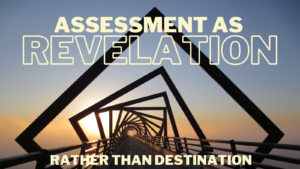The Future of Assessment

One of the most important trends in US education at the end of 2014 is the resistance to large scale end of year assessment. Combined with concerns about higher standards, incoherent federal policy, and privacy, the anti-testing vitriol reached new levels this year. A new report suggests a positive (but not simple) end to this story.
With echos of a March report on the Opportunity to Lead and shades of Fullan and Hammond, Wilhoit, and Pittenger, a new report by Sir Michael Barber and Dr. Peter Hill outlined six key features of the education revolution:
- Capacity to learn: Practices that build on prior learning and reflect a belief in the potential for all students to learn and achieve high standards, given high expectations, motivation and sufficient time and support
- Curriculum: A greater emphasis on deeper learning of big ideas and more explicit and systematic attention to cross-curricular and 21st century skills
- Policy: The student as the focus of educational policy and concerted attention to personalized learning (see recent iNACOL summary of student-centered policy)
- Opportunity to learn: Students able to progress at different rates and with time and support varied to meet individual needs; increased access to care and education to better align with the realities of modern living and working; greater use of the home, the community and other settings as contexts for 24/7 learning
- Teaching: Increasing reliance on sophisticated tutor/online instruction with greater differentiation in educator roles and the creation of learning partnerships between and among students, teachers and families, with the teacher as the ‘activator’
- Teacher quality: Teaching as a true profession with a distinctive knowledge base, a framework for teaching with well-defined common terms for describing and analyzing teaching and strict control by the profession itself on entry into the profession.
The report, Preparing for a Renaissance in Assessment, is critical of current testing regimes for focusing on a narrow set of low level skills. They criticize an over-reliance on grades that reveal little about what the student can do and call for “validated learning progressions” with efficient processes for collecting and analyzing data and easy-to-use assessment tools.
In contrast to current state testing systems, Barber and Hill suggest assessment should:
- Accommodate the full range of student abilities
- Provide meaningful information on learning outcomes
- Accommodate the full range of valued outcomes
- Support students and teachers in making use of ongoing feedback to personalize instruction and improve learning and teaching
- Have integrity and that are used in ways that motivate improvement efforts and minimize opportunities for cheating and ‘gaming’ the system.
New technology can help in each of these areas. Barber and Hill recommend the use of adaptive testing to generate more accurate estimates of student abilities across the full range of achievement while reducing testing time.
They note that online environments facilitate, “The collection and analysis in real time of a wide range of information on multiple aspects of behavior and proficiency,” as well as, “More immediate, detailed and meaningful reporting to specific stakeholder groups, such as via smartphone/tablet devices and through the creation of e-portfolios.”
The authors are bullish on automated assessment including essays and constructed response items and believe online assessments will continue to improve the ability to measure deeper learning including “a range of inter- and intra-personal competences and character traits.”
Barber and Hill recommend multiple retakes (and ultimately on-demand assessment) for important certification tests and “intelligent accountability systems” that utilize multiple indicators to create incentives for personalization and improvement.
Policy makers should, according to Barber and Hill, think long-term, create learning and assessment infrastructure, build partnerships, develop teacher capacity, allow experimentation and variation.
The report recommends applying a ‘delivery’ approach: make it a priority, plan ahead, ensure routine check-ins with all key players and make clear who is responsible, solve problems as they arise, do so conscious of what is happening elsewhere in the world, and ensure systematic learning from it. This sort of iterative approach requires constant communication and stakeholder engagement.
“People frequently change their behaviors before they change their beliefs,” according to Barber and Hill, “New, positive experiences with next-generation assessment will be a powerful motivator, especially when they relate to fulfilling moral purpose.” In other words, when most students and teachers experience the benefits of adaptive learning and continuous feedback, next-generation assessment must be willingly embraced by the profession.
The report concludes that, “There is consensus among leaders in the field that we are on the brink of an assessment renaissance that will help secure high standards for all, remove current achievement ceilings and support a focus on the higher-order thinking and inter- and intra-personal skills vital for living and learning in the twenty-first century.”
Of the technical, psychometric, pedagogical, and political challenges ahead–particularly in America–”Leadership is the key to system transformation.”
For more on assessment, check out:







0 Comments
Leave a Comment
Your email address will not be published. All fields are required.